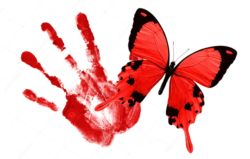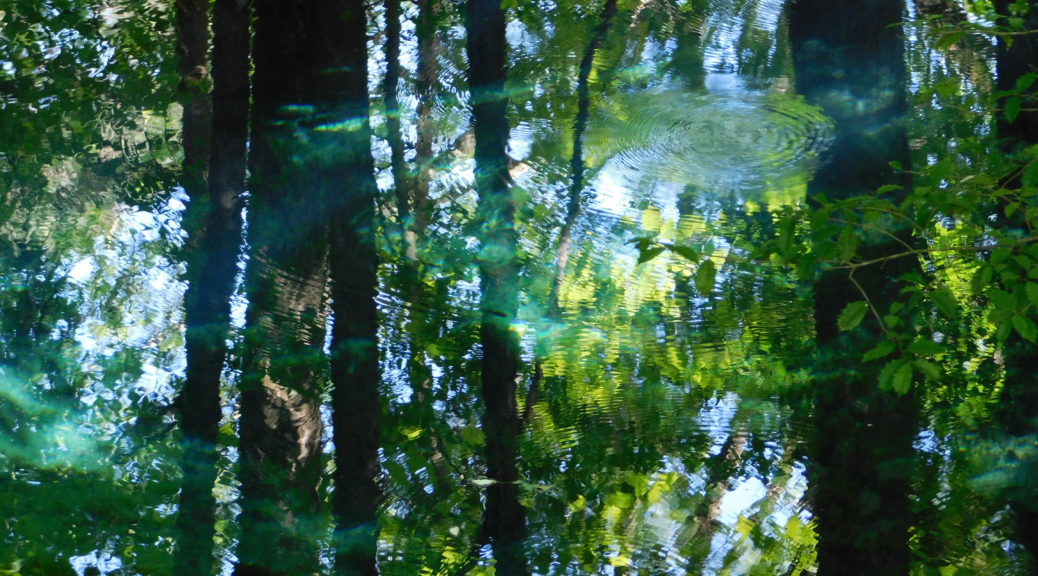JOURNEY OF TEARS
That whole morning and night before were one long prayer for assistance. I woke at four, and sat in the living room of my friends’ river-side house, speaking aloud to the darkness, undamming the river, flooding inside.
Then I got ready, and drove to Red Clay State Park.
For years, my feet have taken me to Red Clay State Park, near Cleveland, Tennessee. This land was once the last seat of Cherokee government, and also the place where, in 1838, the Cherokee people learned that the Treaty had again been broken, their remaining land would be taken, and they would be forcibly “removed” to Oklahoma and parts unknown. Thousands and thousands of people died.
I’ve hiked under the oak trees, sat by the Cherokee Flame of Remembrance, and said prayers by the Blue Hole, a deep spring that was the source of water and purification for the Cherokee who lived in the area. For me, it became a place to heal from the abrasions of the world, to gather strength for the next big push.
Last October, trying to recover from chronic fatigue, I decided to listen to my feet. They were clearly leading me to Red Clay for a reason. I stopped by the Visitor Center: “Excuse me, I’m a poet and love your park. Can I speak with your manager about creating a poetry workshop at Red Clay?”
After receiving the initial go-ahead from Erin, the park’s manager, I wondered who could help me with Cherokee history and culture? I could handle the poetry workshop, but I wanted the program to fully reflect both past and present Cherokee life. It would not be possible for me, a woman of European descent, to speak from experience – which is what is needed.
Fortunately, through mutual friends, I was connected with the park’s former manager, Lois, who also happens to share my faith – we’re both Baha’is. Lois gave me Jerry’s name, an educator of Cherokee descent, who created many programs for Red Clay in the past. I gave Jerry a call and the minute I mentioned Lois’s name, she agreed to meet me for coffee.
Over six months, the workshop evolved from a vague idea in my head to a real action plan. May 5 is a National Day of Awareness of Missing and Murdered Indigenous Women. We got permission from the park to hold the workshop on this day.
Talk about nerves. I’ve created arts-based programs in the past, but this was a completely new idea. And I was trying to pull it off as an independent agent – without institutional backing. So I reached out to family and friends and told them about my idea. Women and men all over the country offered to help – to raise funds, invite friends, take photos, and spread the word.
Prayers flowed, full of love, giving me energy and a little more confidence:
“I hope the Red Clay retreat is deep and knowing and expansive. I know you’ve put your heart and soul into this… I hope today is beautiful, powerful and heart-opening.” – Tim, Washington, D.C.
“I know it will bring about beautiful light. I sooo wish I could be there to share with you…My prayers are with you always and especially for this next project coming up!” – Hasti, Chicago, IL
Abundant, overflowing, ardent prayers for Red Clay Rising!! Today!!! – Kit, Washington D.C.
Thousands of Native women are missing, murdered, presumed dead every year. Our sisters and mothers are disappearing through the cracks in a shattered justice system. Our daughters and aunts are falling through the tangled web of overlapping federal, state, local and tribal jurisdictions.
They are being hurt and killed before they have a chance to see the promise of this day – this Day when every soul and every community that has ever been forgotten, outcast, and oppressed is rising up and crying out:
I am this land
I want you to see
That I am human
And you are just like me.
– Land Song, by Paula Nelson
 On May 5, 2019, about 20 women and men, from many cultures and faiths, gathered at Red Clay State Park. Jerry began with a presentation on the role of Cherokee women in society, showing us traditional handcrafts and sharing the power that Cherokee women hold: To make war, decide prisoners’ fate, raise children, and educate the next generations. Cherokee women are equal to men, in home, community, and governance spheres.
On May 5, 2019, about 20 women and men, from many cultures and faiths, gathered at Red Clay State Park. Jerry began with a presentation on the role of Cherokee women in society, showing us traditional handcrafts and sharing the power that Cherokee women hold: To make war, decide prisoners’ fate, raise children, and educate the next generations. Cherokee women are equal to men, in home, community, and governance spheres.
After questions, I shared some statistics that may help jar us from our seats:
- More than 4 in 5 American Indian and Alaska Native women have experienced violence
- More than 1 in 2 have experienced sexual violence
- In some communities, indigenous women are murdered at 10 times the national average
- 5,712 cases of missing and murdered indigenous women were reported in 2016
Numbers can help build momentum, but justice only comes when people actually encounter each other, face to face. When we look each other in the eyes, listen without judgement, take responsibility, and work together – that’s when healing happens.
Out under the trees, sitting in a half-moon near the Blue Hole, I shared the personal origins of this workshop, and passed out the handmade paper “word chimes” I had made for each participant.
“The paper actually comes from the Holy Land. In 2001, my mother, Jacqueline, worked on an extraordinary project – creating a public presentation for the opening of the Baha’i Terraces in Haifa. Some paper was left over, which the organizers were allowed to keep. I found a large folder of this paper as I was preparing for Red Clay. Because it is handmade and from a holy place, it felt like the perfect medium for sharing our deepest prayers, wishes, and poems for healing and justice.”
The day before, rain had swamped Tennessee. But by Sunday afternoon, a soft, clear light was moving through the trees, carried by a cool wind. Each person took two pieces of handmade paper, tied with red ribbon – for remembrance – and spent some quiet time, thinking, writing, connecting.
I asked each person to write two poems, one to keep, and one to give to the park, as an offering. Erin, the park manager, had kindly agreed to give me a small exhibit space in their museum. I wanted other visitors to feel and heed the voices of these women and men – gathered together in the same place where the different bands of the Cherokee nation had finally reunited in 1984, 150 years after the Trail of Tears had shattered them.
Violence against Indigenous peoples is at the root of our nation. It has never been fully acknowledged, or healed. The effects are felt today, by Native communities that continue to live poorer and die younger that the average white American. The effects are embodied by Native women, who are often at higher risk of violence and death than their white sisters. And the effects are echoed in the bodies and psyches of all Americans, all people, in the disharmony we feel inside us and around us. This disharmony is the cause of illness, pain, and suffering…and it can be remedied.
One of the women, Betty, wrote a poem to her Great-Grandmother. She was Cherokee and endured the long march from Tennessee to Tulsa. Betty asked, “Did you feed them, give words of comfort, pray for them?”
So I too will ask:
Who will you nourish today? Who will you comfort today? Who will you pray for today?
Please include yourself in your answers.
- Sacred Fires: Betty Shabazz, MLK and Thich Nhat Hanh – by Andréana Lefton - February 10, 2020
- Healing the Trails of Tears – by Andréana Lefton - June 19, 2019

